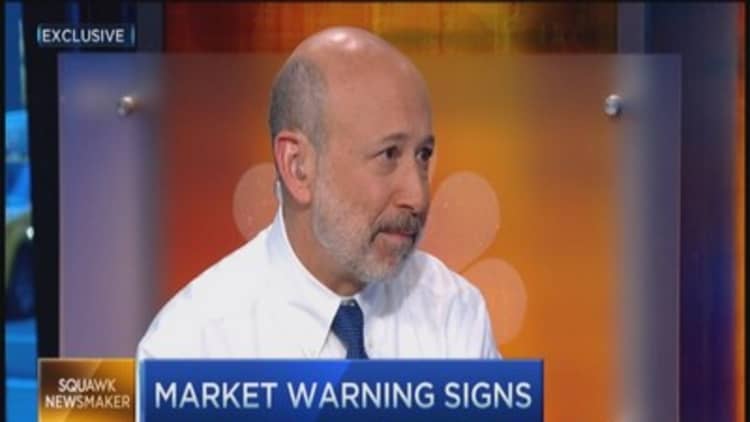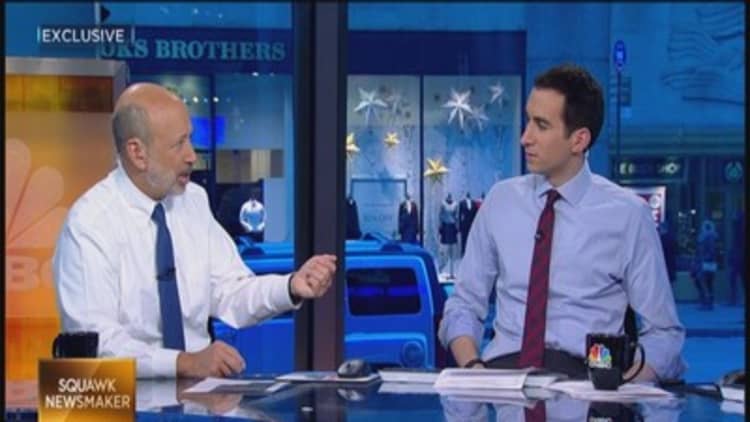


Goldman Sachs chief Lloyd Blankfein, told CNBC on Wednesday that the drop in oil prices may indicate deflationary pressures, not just an abundance of supply.
"The market is suggesting a protracted deflationary period," he said. "I don't think it, but that's the sensible way of interpreting what's going on."
Read MoreEl-Erian: Oil, currency realignments key in 2015
Falling oil prices have been a drag on stocks.
Brent crude dipped below $50 a barrel early Wednesday for the first time since May 2009. U.S. oil prices fell below $47 after a 4 percent decline in New York trading Tuesday.
The fell for a fifth-straight session Tuesday. That marked the third-consecutive down day in 2015—the worst ever start to a year, a 2.7 percent decline for 2015.
Blankfein said he won't extrapolate too much from the tough start for stocks.
The macro picture still looks favorable, he added—citing above-trend economic growth for the U.S. and the continued expectation for very low interest rates. "That's a very good environment for asset prices and for stocks."
He said he if were the Fed he'd "take a lot of risk on the inflation side ... and take that risk to avoid a low but very adverse consequence of [economic] backsliding."
"The only game in town has been monetary," he continued. "But I would keep firing because sustaining it is a lot more sure than losing it and trying to recapture the momentum."
Should big banks break up?
Goldman Sachs recently ramped up the drumbeat for breaking up JPMorgan Chase.
A recent research report led by Goldman analyst Richard Ramsden said the Fed's newly increased capital proposal had the effect of "reigniting the debate about whether a [JPMorgan] breakup could unlock shareholder value given that size is now a regulatory negative."
Read More For JPMorgan, breaking up could be hard to do
Asked about that report, the Goldman chairman and CEO said: "I read that when you did because you know we separate research."
He refused to say whether he personally thought JPMorgan should break up, speaking more broadly on the issue of the cost of holding more capital. "The structure of the capital rules assign a higher capital to your entire enterprise balance sheet the bigger you and the more complex your are—for JPMorgan and Goldman Sachs."
"What's the value of size and complexity? Well, synergies," he continued. "But now there's a cost to size and complexity. Extra capital you need to have. That capital has a price."
Blankfein said he has no plans to break up Goldman, but argued that anyone running a large financial institution needs think about these kinds of tradeoffs.
Concerns about 'fat finger' trade costs
His major concerns? Blankfein said he worries about the downside of relying too much on technology in the financial industry.
"People are talking about cyberterrorism and bad behavior," he said. "But what about mistakes ... bad software, a wrong button."
"In the old days, you had a 'fat finger' and you would have a $100,000 mistake," he recalled. "Could you [now] have a $100 million mistake? Could you have a billion dollar mistake?"
Blankfein appeared on CNBC's "Squawk Box" Wednesday morning, as the show debuted in its new home in New York City.


